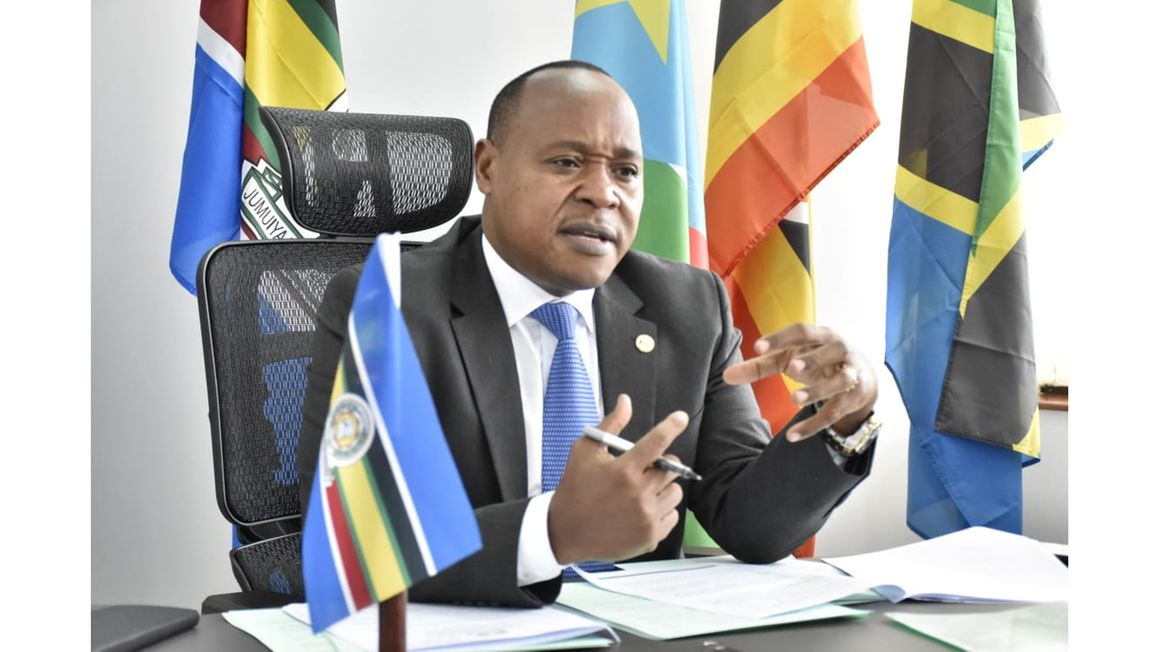
EAC’s secretary general, Peter Mathuki.
Arusha. The East African Community (EAC) is developing a strategy to boost trade-in-services.
This will position the bloc better in the negotiations of service liberalisation at the continental level.
The EAC’s secretary general, Peter Mathuki, revealed this on Thursday during a Webinar on trade-in-services under the African Continental Free Trade Area (AfCFTA) Agreement.
Dr Mathuki was the chief guest in the virtual meeting hosted by the East African Business Council (EABC).
Services account for 54 percent of Africa’s gross domestic product (GDP), and slightly below half of the GDP in East Africa.
The five priority services sectors being fronted by the African Union (AU) for liberalisation are financial services, communications, transport, tourism and business services
Speaking during the opening session, EABC executive director John Bosco Kalisa said trade-in-services on the continent remained far below its potential level.
Africa, he said, accounts for only two percent of global service exports and African service exports are largely dominated by travel (42 percent of African service exports).
“Services account for 54 percent of African GDP and 75 percent of Greenfield Foreign Direct Investment (FDI) in our continent.
“In the East African Community, services account for slightly below half of the GDP,” he pointed out.
Mr Kalisa elaborated that stakeholders such as private service providers were crucial to informing the AfCFTA services negotiations with practical experience on the ground.
“It is imperative that non-state actors - such as firms in services sectors - be actively engaged in the preparations for the EAC schedule of commitment and regulatory framework negotiations of services under the AfCFTA,” he said.
Mr Million Habte of the AfCFTA Secretariat revealed that the deadline for finalisation of negotiation on liberalisation of trade in services is set for June 2022 by the Council of Ministers.
Already, 46 state parties to the AfCFTA have submitted their initial offers on liberalisation of Trade in Services/ Schedules of specific commitments.
State parties to the AfCFTA who have submitted their initial offers on service liberalisation but have not ratified the Agreement are expected to do so in good faith.
Agreement by consensus on negotiations by Regional Economic Communities and overlapping membership, Covid-19 pandemic are among the issues in negotiations of Trade in Services. Tanzania, Burundi, Uganda and Kenya have developed national offers with various commitments and the EAC Secretariat consolidated them into a draft regional offer.
“Limited participation of the private sector and knowledge on technical offers development hinders liberalization of services trade,” said Dorica Phiri Nkhata, a trade expert.
She argued for more audits and studies to be done to support comprehension of existing restrictions – laws and regulations on services in Africa.
Firms, the real traders in the AfCFTA and the EAC bloc together with the private sector were requested to analyse the service sectors of their interest to be liberalized under the AfCFTA - and reciprocate accordingly.
Prof Gerhard Erasmus, a member of Tralac Associates, said the EAC has deeper commitments of Customs Union and Common Market compared to the African Continental Free Trade Area.
Mr Tsotesti Makong said trade in services negotiations should take into consideration the evolution of services and technology in the 21st century such as tele-medicine and crypto-currency.
He explained that other services sectors are liberalised not within the context of trade in service such as the Comesa insurance scheme and mutual recognition of drivers license in Sadc member states.
He stated that such positive developments should be promoted under the trade in services negotiations at AfCFTA level. Mr Makong recommended that African countries should consider using the negative approach of a list of negotiations to boost services trade.
The EAC Offer on Trade in Services under AfCFTA is expected to be more liberal and should ensure the integrity of the commitments made under the EAC Common Market Protocol (CMP) is not lost.
According to UNCTAD in 2017 services accounted for only 22 percent of African trade and African exports remain highly concentrated on agriculture and primary goods.

No comments:
Post a Comment